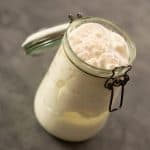Description
Simple clabbered milk recipe that you can make quickly and easily at home.
Ingredients
- Raw milk
- Lemon juice (optional)
Equipment
- Sterilized glass jar with a lid
- Cloth for draining
- Another dish or jar to collect drained whey
Instructions
- Before we dive into details, it’s worth mentioning that you need a sterile environment to properly ferment your milk. So, the first step is to sterilize a glass jar and its lid in boiling water.
- Since glass tends to break at high temperatures, make sure to fill the jar with water and put it in cold water. Then wait for it to gradually warm-up. Leave it sitting in hot water for a few minutes.
- Dry both the jar and the lid with a clean towel and leave them to cool down before pouring raw milk inside.
- Once your jar has cooled down, pour the raw milk in. Put the lid on, but loosely.
- For your raw milk to become sour milk, you need to let it sit at room temperature (68F – 78F pr 20C – 26C) between 1 and 5 days. If you want to get super soured milk, you can add 1 tablespoon lemon juice into raw milk.
- You’ll know your milk is done clabbering once you notice that curds and whey have begun to separate.
- The next step will be to take a cloth and separate the curds and whey by draining the mixture through the cloth. The longer you drain it the thicker the end product will be.
- As you drain the curds try not to spill the whey. You can use it as a starter culture for some future milk culturing projects: cottage cheese, sour cream, cream cheese, yogurt, etc.
- Also, save a few spoons of clabber milk from this batch. It will come in handy when you decide to prepare the next batch, as it will speed up the souring process.

